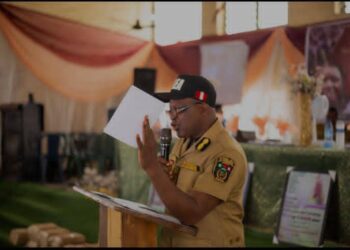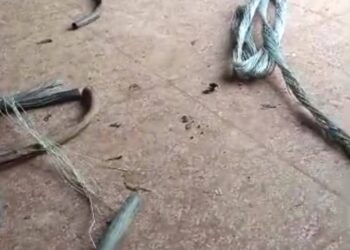By Sayo Àlàgbé
The remains of the late Mrs. Olubola Oyinboade Egunbiyi (née Àkàndé) were finally laid to rest today at the family burial site near Adeniran Grammar School, Alao Akala Memorial Way, Ogbomoso.

People from all walks of life gathered to pay their last respects to a woman they described as a dedicated teacher and a woman of substance. The funeral service for her repose was held at Ola-Oluwa Baptist Church, Randa, Ogbomoso, with uplifting renditions from the church choir.
The officiating minister, Rev. Dr. Olabode Durojaye of Bethel Baptist Church, Ajah, Lagos, congratulated the Egunbiyi family on the grace of having God in their lives. He expressed his joy at the large crowd that attended the service of songs held in Lagos on Tuesday in honor of the deceased.
Rev. Durojaye emphasized that the Egunbiyi family was not in deep mourning because the late Mrs. Egunbiyi lived a life devoted to God and humanity. He described her as a generous and selfless giver who never took the work of God lightly. Quoting Ecclesiastes 7:1-2, he reminded the congregation that death is inevitable and that everyone will face it someday.
In his sermon titled “Reality of Life After Death,” Dr. Durojaye urged the attendees to reflect on the essence of life, emphasizing that it is better to visit a place of mourning than to spend time in houses of merriment. He noted that no matter how long one lives, death is inevitable.
He further advised the congregation to live righteously and do good, particularly for the less privileged, citing the biblical story of the rich man and Lazarus. He admonished those still alive to hold firmly to their faith and accept God as the ultimate guide.
Following the church service, Mrs. Egunbiyi was laid to rest, after which a light reception was held at LSG Hotels, Randa, Ogbomoso, hosted by her husband, Otunba Bayo Egunbiyi, for family members, friends, and well-wishers.
Among the dignitaries present at the church service were members of the Ogbomoso First Group, including Otunba Bayo Babatunde, Engineer Akin Oyekola, Mr. Kolapo Oyadiran, Retired Oyelowo, Judge Funmi Asaolu, Mr. Dapo Idowu, ACG, Tunji Aremu Rtd, Mr. Bayo Bamidele. Others are, Mr. Akinloye Idowu, Mr. Mathew Ojedokun to mention but a few
You can get every of our news as soon as they drop on WhatsApp ...To get all news updates, Join our WhatsApp Group (Click Here)












